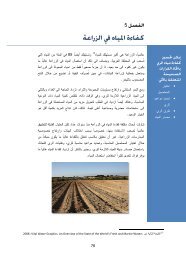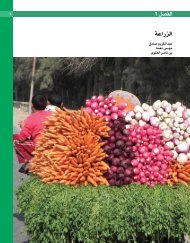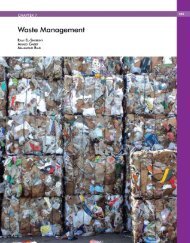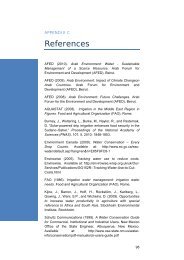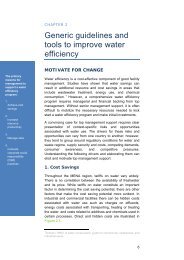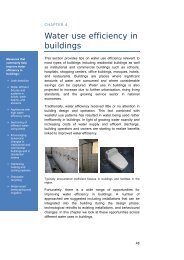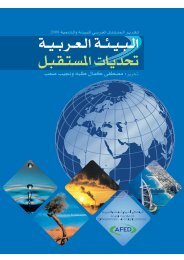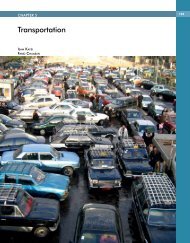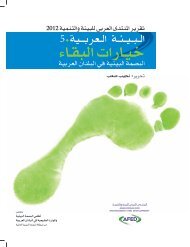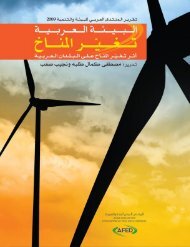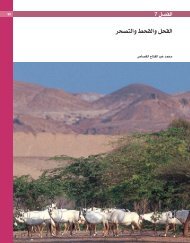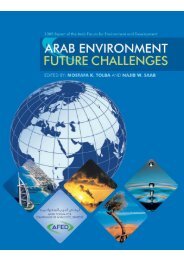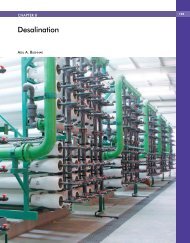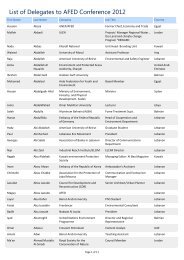Impact of Climate Change on Arab Countries - (IPCC) - Working ...
Impact of Climate Change on Arab Countries - (IPCC) - Working ...
Impact of Climate Change on Arab Countries - (IPCC) - Working ...
Create successful ePaper yourself
Turn your PDF publications into a flip-book with our unique Google optimized e-Paper software.
ARAB ENVIRONMENT: CLIMATE CHANGE 85<br />
• Cultivati<strong>on</strong> <str<strong>on</strong>g>of</str<strong>on</strong>g> drought-tolerant crops.<br />
• Reduced habitat fragmentati<strong>on</strong> by means <str<strong>on</strong>g>of</str<strong>on</strong>g><br />
corridors and c<strong>on</strong>necti<strong>on</strong>s between different<br />
areas.<br />
• Rati<strong>on</strong>alized water and land use to protect wetlands<br />
and riparian habitats.<br />
• Increased area and number <str<strong>on</strong>g>of</str<strong>on</strong>g> protectorates.<br />
• Rati<strong>on</strong>al use <str<strong>on</strong>g>of</str<strong>on</strong>g> renewable and n<strong>on</strong>-renewable<br />
water resources through the adopti<strong>on</strong> <str<strong>on</strong>g>of</str<strong>on</strong>g> modern<br />
irrigati<strong>on</strong> techniques as a substitute to the<br />
c<strong>on</strong>venti<strong>on</strong>al systems in the irrigated areas.<br />
The Sudanese authorities have adopted the following<br />
strategies (Babikr et al., 2009) in their<br />
plans to adapt to climate change:<br />
• Capacity building <str<strong>on</strong>g>of</str<strong>on</strong>g> relevant stakeholders for<br />
better understanding <str<strong>on</strong>g>of</str<strong>on</strong>g> climate change scenarios<br />
and risk analysis.<br />
• Public awareness <strong>on</strong> climate change issues and<br />
implicati<strong>on</strong>s.<br />
• Crisis management.<br />
• Technology transfer including modern irrigati<strong>on</strong><br />
systems, water harvesting, desalinati<strong>on</strong>,<br />
water transport and recycling <str<strong>on</strong>g>of</str<strong>on</strong>g> waste water.<br />
• Afforestati<strong>on</strong> and reclamati<strong>on</strong> <str<strong>on</strong>g>of</str<strong>on</strong>g> marginal and<br />
waste land.<br />
• Utilizati<strong>on</strong> <str<strong>on</strong>g>of</str<strong>on</strong>g> cost-effective envir<strong>on</strong>mentfriendly<br />
energy.<br />
• Combat desertificati<strong>on</strong> and land degradati<strong>on</strong>.<br />
Sustainable and integrated water resource management.<br />
• C<strong>on</strong>structi<strong>on</strong> <str<strong>on</strong>g>of</str<strong>on</strong>g> water storage facilities.<br />
• Establishment <str<strong>on</strong>g>of</str<strong>on</strong>g> climate pro<str<strong>on</strong>g>of</str<strong>on</strong>g> projects.<br />
Libya places more emphasis <strong>on</strong> the following<br />
points:<br />
• Preparati<strong>on</strong> <str<strong>on</strong>g>of</str<strong>on</strong>g> an inventory <str<strong>on</strong>g>of</str<strong>on</strong>g> activities leading<br />
to the emissi<strong>on</strong> <str<strong>on</strong>g>of</str<strong>on</strong>g> greenhouse gases including<br />
the energy, transport, industry, agriculture,<br />
health, envir<strong>on</strong>ment, housing and utilities.<br />
• Combine policies <str<strong>on</strong>g>of</str<strong>on</strong>g> climate change in the<br />
nati<strong>on</strong>al policy and update supporting legislati<strong>on</strong>.<br />
• Educati<strong>on</strong> and public orientati<strong>on</strong> programs.<br />
Data collecti<strong>on</strong>, exchange and analysis.<br />
• Study <str<strong>on</strong>g>of</str<strong>on</strong>g> the extent <str<strong>on</strong>g>of</str<strong>on</strong>g> exposure <str<strong>on</strong>g>of</str<strong>on</strong>g> the country<br />
to climate change.<br />
VII. CONCLUSION<br />
AND RECOMMENDATIONS<br />
The <strong>Arab</strong> world is located in <strong>on</strong>e <str<strong>on</strong>g>of</str<strong>on</strong>g> the most arid<br />
areas <str<strong>on</strong>g>of</str<strong>on</strong>g> the world. The area <str<strong>on</strong>g>of</str<strong>on</strong>g> <strong>Arab</strong> countries<br />
c<strong>on</strong>tains almost 10% <str<strong>on</strong>g>of</str<strong>on</strong>g> the world’s dry land,<br />
while the regi<strong>on</strong>’s populati<strong>on</strong> is <strong>on</strong>ly 5% <str<strong>on</strong>g>of</str<strong>on</strong>g> the<br />
world populati<strong>on</strong>. Alarmingly, water resources in<br />
the <strong>Arab</strong> countries are very limited, making up<br />
<strong>on</strong>ly 1% <str<strong>on</strong>g>of</str<strong>on</strong>g> the world’s renewable fresh water.<br />
Almost two thirds <str<strong>on</strong>g>of</str<strong>on</strong>g> water in the <strong>Arab</strong> world<br />
originates in n<strong>on</strong>-<strong>Arab</strong> countries miles away.<br />
Almost 80% <str<strong>on</strong>g>of</str<strong>on</strong>g> water resources are used in the<br />
agriculture sector which c<strong>on</strong>sumes vast amounts<br />
<str<strong>on</strong>g>of</str<strong>on</strong>g> water due to severe climatic c<strong>on</strong>diti<strong>on</strong>s. Fast<br />
growing populati<strong>on</strong> and the need to raise people’s<br />
standard <str<strong>on</strong>g>of</str<strong>on</strong>g> living increase water c<strong>on</strong>sumpti<strong>on</strong><br />
dramatically. The expected effects <str<strong>on</strong>g>of</str<strong>on</strong>g> climate<br />
change might aggravate the situati<strong>on</strong> by reducing<br />
river flows and rainfall as well as deteriorating<br />
groundwater quality.<br />
Mitigati<strong>on</strong> <str<strong>on</strong>g>of</str<strong>on</strong>g> the causes <str<strong>on</strong>g>of</str<strong>on</strong>g> climate change<br />
includes: less and efficient c<strong>on</strong>sumpti<strong>on</strong> <str<strong>on</strong>g>of</str<strong>on</strong>g> fossil<br />
fuel, more producti<strong>on</strong> <str<strong>on</strong>g>of</str<strong>on</strong>g> renewable energy and<br />
more cultivati<strong>on</strong> <str<strong>on</strong>g>of</str<strong>on</strong>g> forestry and green areas.<br />
Adaptati<strong>on</strong> measures include: protecti<strong>on</strong> <str<strong>on</strong>g>of</str<strong>on</strong>g> lowlying<br />
lands and river deltas from inundati<strong>on</strong> and<br />
sea water intrusi<strong>on</strong>, change <str<strong>on</strong>g>of</str<strong>on</strong>g> cropping patterns,<br />
adopti<strong>on</strong> <str<strong>on</strong>g>of</str<strong>on</strong>g> water saving techniques and introducti<strong>on</strong><br />
<str<strong>on</strong>g>of</str<strong>on</strong>g> integrated water resource management.<br />
Finally, <strong>Arab</strong> countries have to rec<strong>on</strong>sider water<br />
allocati<strong>on</strong> am<strong>on</strong>g different development activities<br />
where water use efficiency represented by producti<strong>on</strong><br />
per cubic meter <str<strong>on</strong>g>of</str<strong>on</strong>g> water overrules producti<strong>on</strong><br />
per unit area <str<strong>on</strong>g>of</str<strong>on</strong>g> land, i.e., optimizati<strong>on</strong><br />
<str<strong>on</strong>g>of</str<strong>on</strong>g> water use which gives maximum ec<strong>on</strong>omic<br />
return per unit volume <str<strong>on</strong>g>of</str<strong>on</strong>g> water.



